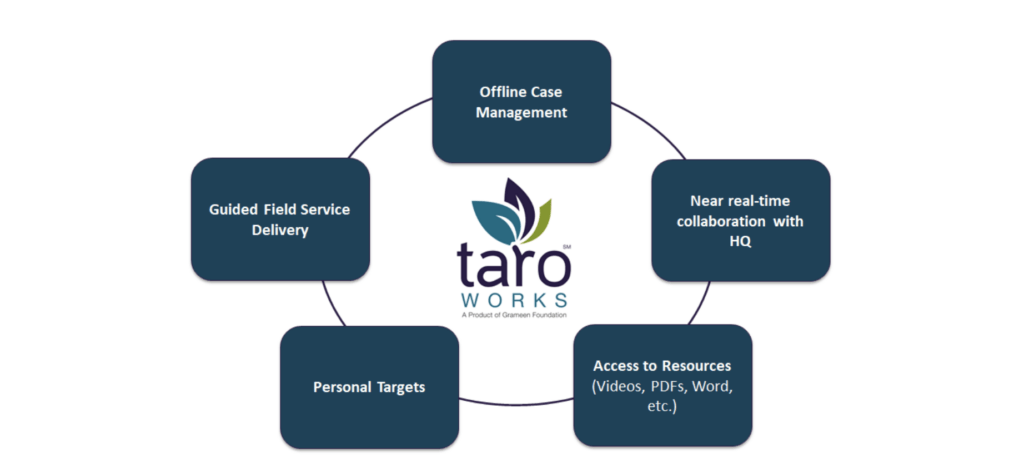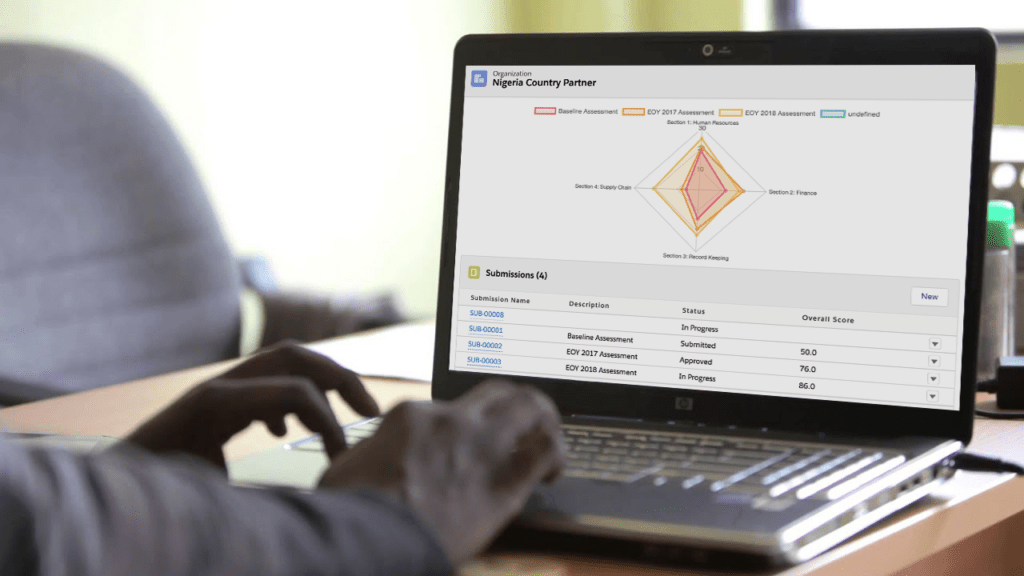Over the last decade, Salesforce – the world’s leading cloud computing platform – has steadily become a go-to platform for nonprofit program management. As COVID-19 has disrupted many aspects of nonprofit programming – from fundraising to delivery – the need for a centralized, end-to-end program management system is more important than ever before. Leveraging powerful tools like Amp Impact, TaroWorks, and the Salesforce.org Program Management Module (PMM), nonprofits can manage the full program lifecycle on Salesforce, bringing data and teams together on a single platform to inform decision-making and drive more efficient, cost-effective programs.
What is Program Management?
“Program management enables team members with the information they need to deliver program tasks when they need it,” says TaroWorks COO Elaine Chang. “It is the second half of the equation after fundraising – coordinating programs and providing services that need to be tracked and reported as they’re happening.”
The Evolution of Nonprofit Program Management
When we founded Vera Solutions in 2010, most organizations we served had a one-way flow of data from paper to Excel, and there weren’t any feedback loops in place. Despite their staff’s best efforts to use data effectively, vital information that could help inform programmatic changes and improvements were often trapped in stacks of paper and increasingly burdensome spreadsheets. We started Vera Solutions to help organizations leverage the power and flexibility of Salesforce to track their impact, streamline their operations, and create feedback loops that put data in the hands of staff who need it.

“Having a cloud-based platform has been very beneficial for organizations who have had to change the way they work due to COVID-19,” says Hetile Mabunda, a Solutions Engineer at Vera Solutions. “Rather than worrying about additional infrastructure to access their data from home, they can pivot the focus of their programs towards COVID-19-related work.”
While a centralized Salesforce CRM is a good start for ensuring more accurate and accessible data across an organization, many nonprofits are still struggling to use the data to understand their impact and inform program design and delivery. This is where integrated tools like TaroWorks, the Salesforce.org PMM, and Amp Impact come in.
TaroWorks is a Salesforce-based field service mobile app that allows field agents to collect and access data and manage fieldwork tasks in remote, offline areas. When field agents have a signal or wifi connection, they can sync with Salesforce, pushing data from the mobile ‘up’ and bringing any new relevant data from the system back ‘down’. These data can push into Standard Salesforce objects (like Household Accounts and Contacts), objects in the PMM (like Program Engagements, Services, and Service Deliveries), custom objects, and/or objects in Amp Impact. Amp Impact is a packaged program and impact management solution on Salesforce that helps nonprofits track the outcomes, performance indicators, implementation, and cost-effectiveness of their programs over time.

Next, we’ll break down how TaroWorks, Amp Impact, and Salesforce work together to synthesize data across the program lifecycle – from service delivery to impact reporting – with real-world examples from two data-driven nonprofits.
End-to-end Program Management on Salesforce
Service Delivery
With paper-based data collection, organizations often encounter time- and labor-intensive processes in collecting and analyzing data. Additionally, field agents working in offline areas do not have access to the critical information stored in the organization’s centralized database. With TaroWorks, there is a two-way flow of data between the field and the head office, empowering frontline agents with access to data they need for efficient and effective service delivery, and decision-makers with near real-time insights to quickly pivot program activities to ensure success.

“Before Salesforce, it took up to three months for data entry and analysis,” the BOMA Project’s IT Manager Monica Kundu shares. “This meant it took 90 days before we could intervene if a program participant had issues. Our graduation rates were not good because we did not have visibility and capabilities to intervene early on when a participant was experiencing a shock.”
Thus in 2016, BOMA partnered with Vera Solutions to build a Salesforce system that replicates their project implementation, from targeting project participants to ensuring success to graduation. The system integrates with TaroWorks to provide real-time access to data, allowing BOMA to quickly address any necessary changes.
“With a click of a button, we could access a report to know the health of a program cohort. We could then pivot and direct funds to something that would have a positive impact,” Monica says. “This impacts the 34,000 women given the opportunity to become entrepreneurs – and even more individuals in their communities.”
Program Monitoring, Evaluation, and Learning (MEL)
Once the data is in the system, it needs to be managed, analyzed, aggregated, and dispersed across the organization to inform people’s daily work and decisions. It feeds to the fundraising and marketing teams to help create and share stories of organizational impact. It feeds to the finance team and senior management to ensure resource inputs are effectively leading to positive outcomes. It feeds to the program team to identify areas of inefficiencies and drive continuous improvement. It feeds to decision-makers to monitor progress on strategic goals. Thus, organizations can’t afford the inefficiencies and missed opportunities for learning and improvement caused by data silos.Amp Impact breaks down data silos, streamlining workflow and data flow between local offices, country offices, HQ, and ultimately funders and the Board. With out-of-the-box functionality to track project locations, themes, outcomes, expenditure, indicators, activities, risks, and more, Amp Impact provides a central source of truth for program and MEL data.

In 2019, they teamed up again with Vera Solutions to expand their program management and MEL capability with Amp Impact. Amp Impact brings HODI’s program and MEL data onto one platform, allowing staff to allocate donor contributions per project, manage logframes online, input targets and results, and track budgets and expenditures. The system came at the perfect time, making data accessible to staff across the organization despite the shift to remote working as a result of the pandemic.
“Having the system in place before COVID-19 has greatly helped us to continue implementing solutions. At the moment, data is updated and shared with everyone,” says HODI’s Acting Executive Director Noor Abdulqadir.
Impact Reporting
The final piece of the program management lifecycle is impact reporting. According to the most recent Salesforce.org Nonprofit Trends Report, 69% of nonprofits say the demand for transparency regarding funding has increased, while 69% report difficulty in sharing impact data with donors.Amp Impact simplifies impact reporting with centralized indicator management, aggregation, and calculation. It also includes narrative reporting templates, performance graphs, and the ability to visualize scored assessments in radar charts. For analytics and data visualization, Amp Impact leverages native, drag-and-drop Salesforce Reports and Dashboards to help organizations answer important questions about their programming and monitor performance over time, but can also extend further with more sophisticated, interactive dashboards built on Tableau, Tableau CRM, or PowerBI.
“Amp Impact’s performance graphs were a huge draw for us as we spent a lot of time creating those in the past and we could now simply copy and paste them into our reports. Dashboards have also allowed us to have an overview of the organization as a whole and produce annual or quarterly reports,” says Noor.

When it comes to the program management lifecycle, we often hear from organizations, “We had no idea this could all be done in one platform!’ The reality is that many organizations have become accustomed to data silos and assumptions that tools like Salesforce should only be used for fundraising or CRM, that financial data should only reside in ERP systems, or that MEL data should live in its own tools or platforms. By bringing data together across the program lifecycle – from field to funder, from inputs to impact – nonprofits gain new, holistic insights that inform decisions and transform programs for the better.
